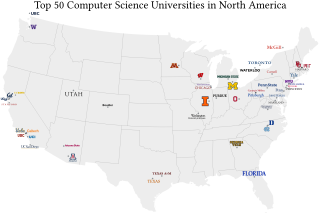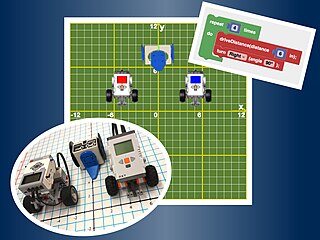The University of California, Berkeley College of Engineering is the engineering school of the University of California, Berkeley. The college occupies fourteen buildings on the northeast side of the main campus and also operates the 150-acre (61-hectare) Richmond Field Station. Established in 1931, the college is considered to be one of the most prestigious and selective engineering schools in both the nation and the world.
The UC Davis Graduate School of Management (GSM) is a graduate business school at the University of California, Davis. Established in 1981, its degree programs include MBA, MPAc and MSBA.

The California Academy of Mathematics and Science (CAMS) is a public magnet high school in Carson, California, United States focusing on science and mathematics. Its California API scores are fourth-highest in the state.
Shaker High School is a public high school in Latham, Albany County, New York, United States, and is the only high school operated by the North Colonie Central School District.

Science, technology, engineering, and mathematics (STEM) is an umbrella term used to group together the distinct but related technical disciplines of science, technology, engineering, and mathematics. The term is typically used in the context of education policy or curriculum choices in schools. It has implications for workforce development, national security concerns, and immigration policy, with regard to admitting foreign students and tech workers.

Island Pacific Academy (IPA) is a private, independent, co-educational, college-preparatory school serving grades K-12, with a current enrollment of approximately 550 students. Located in Kapolei, Hawaii, IPA was founded in 2004 and enrolled its first students in September 2004.
The Science/Engineering Specialized Learning Center, S&E or SnE, is a public high school magnet program housed within Manalapan High School, located in Englishtown, in Monmouth County, New Jersey, United States. The program, started in 1985, is designed for students with an interest in focusing on mathematical and scientific subjects.

Sally Ride Science at UC San Diego is a nonprofit run by the University of California, San Diego. It was founded as a company in 2001 by Sally Ride, America's first woman in space, along with Tam O'Shaughnessy, Karen Flammer, Terry McEntee, and Alann Lopes to inspire young people in science, technology, engineering, and math (STEM) and to promote STEM literacy. Sally Ride Science was relaunched as a non-profit at UC San Diego on October 1, 2015. It is based at UC San Diego Extension, and its programs are coordinated jointly by UC San Diego Extension, Scripps Institution of Oceanography, and San Diego Supercomputer Center. O'Shaughnessy is executive director and Flammer is director of education for Sally Ride Science at UC San Diego.

Times2 STEM Academy is a charter school in Providence, Rhode Island that specializes in teaching science, technology, engineering, and mathematics.

Opelika City Schools (OCS) is a school district headquartered in Opelika, Alabama. The district is accredited by the Alabama State Department of Education and the Southern Association of Colleges and Schools. The school system enrolls approximately 4,300 students on nine campuses. Opelika has three primary schools with grades K–2, Southview, Jeter, and Carver, three intermediate schools with grades 3–5, West Forest, Northside, and Morris Avenue, Opelika Middle School with grades 6–8, Opelika High School with grades 9–12, and one at-risk school, Opelika Learning Center. Opelika's schools have traditionally had strong programs in technology and the arts.

Computer science education or computing education is the field of teaching and learning the discipline of computer science, and computational thinking. The field of computer science education encompasses a wide range of topics, from basic programming skills to advanced algorithm design and data analysis. It is a rapidly growing field that is essential to preparing students for careers in the technology industry and other fields that require computational skills.
St. Mildred's-Lightbourn School is an independent all-girls school in Oakville, Ontario, Canada with approximately 550 students from Preschool to Grade 12. The Junior school includes girls from pre-school to grade five. The middle school includes grade 6, 7, and 8. The senior school goes from grade 9 to grade 12.

The B.E.S.T. Academy is a STEM certified all-boys school serving 6-12 students in Carey Park, Atlanta, Georgia. The school was opened in 2007, and for a short time was referred to as the boys single gender academy, but was later named by its first principal, Curt R. Green, in honor of neurosurgeon Ben Carson. B.E.S.T. is an acronym for Business, Engineering, Science, and Technology.
CH is a proprietary cross-platform C and C++ interpreter and scripting language environment. It was originally designed by Harry H. Cheng as a scripting language for beginners to learn mathematics, computing, numerical analysis, and programming in C/C++. Ch is now developed and marketed by SoftIntegration, Inc., with multiple versions available, including a freely available student edition, and a CH Professional Edition for Raspberry Pi which is free for non-commercial use.

Tesla STEM High School is a magnet high school in Redmond, Washington operated by the Lake Washington School District. It serves as a lottery-selected choice program and offers a STEM-based curriculum.
The STEM pipeline is a critical infrastructure for fostering the development of future scientists, engineers, and problem solvers. It's the educational and career pathway that guides individuals from early childhood through to advanced research and innovation in STEM-related fields.
Stonyhurst Southville International School is a learning institution in the province of Batangas, Philippines, and one of the Southville Global Education Network (SGEN) schools.

RoboBlockly is a web-based robot simulation environment for learning coding and math. Based on Blockly, it uses a simple puzzle-piece interface to program virtual Linkbot, Lego Mindstorms NXT and EV3, as well as to draw and animate for beginners to learn robotics, coding, math, science, and art. Blocks in RoboBlockly can be executed in debug mode step-by-step. All math activities in RoboBlockly are Common Core State Standards Mathematics compliant.

Chan-Jin Chung, commonly known as CJ Chung, is a full professor of computer science at Lawrence Technological University (LTU) in Michigan, USA. He founded an international autonomous robotics competition called Robofest in the 1999–2000 academic year as well as numerous educational programs for youth by integrating STEM, arts, autonomous robotics, and computer science. He also served as the founding USA National Organizer of World Robot Olympiad (WRO) in 2014 and 2015. He also started the WISER conference in 2014. He is working on developing a computer science curriculum for connected and autonomous vehicles (CAV) with a support from National Science Foundation . His research areas include evolutionary computation, cultural algorithms, intelligent systems & autonomous mobile robotics, software engineering,
Marina Umaschi Bers is the Augustus Long Professor of Education at Boston College. Bers holds a secondary appointment in Boston College's Department of Computer Science. Bers directs the interdisciplinary DevTech Research Group, which she started in 2001 at Tufts University. Her research involves the design and study of innovative learning technologies to promote children's positive development. She is known for her work in the field of early childhood computer science with projects of national and international visibility. Bers is the co-creator of the free ScratchJr programming language, used by 35 million children, and the creator of the KIBO robotic kit, which has no screens or keyboards.











